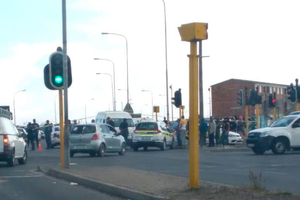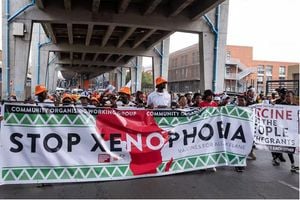
A local taxi driver is pushed around during a confrontation with foreign nationals in the Johannesburg Central Business District on April 15, 2015.
South Africa faces an intense skills shortfall as more professionals and people with specialised skills – like engineers, doctors, technicians and nurses – look abroad for better career options.
According to data aggregator Statista, between 2000 and 2020, some 414,000 people emigrated from South Africa, mostly to the UK, Canada, the USA, Australia and New Zealand.
By 2020, the cumulative number of South African emigrants in the post-apartheid era numbered 915,000.
Notably, the number of people leaving the country increased by 16.3 per cent, in the five years starting 2015, at the height of ‘state capture’ corruption.
Overall, new official figures show increasing numbers turning their backs on South Africa since 2000.
But there are twists in this tale: Since the Covid-19 pandemic in 2020, South Africa’s net migrations have fallen steadily per year, mainly driven by a realisation that the grass may not in fact be greener elsewhere, as those leaving had hoped to find.
There has also been some counter-emigration in which tens of thousands have returned home after having established themselves abroad, due to a range of reasons. Some claim to have missed their homeland, others were disenchanted with life in what many have describe as ‘nanny states’ angered by excessive interventions of the state in one’s personal life.

A refugee talks with a Cape Town City Law Enforcement official as hundreds of people from various African countries are evicted from the makeshift camp they are occupying around the Central Methodist Mission in Cape Town on March 1, 2020. A fresh round of attacks has been reported in Limpopo Province.
In sum total, however, far more skilled people are leaving than arriving.
This is despite a difficult determination made by the ruling African National Congress (ANC) taken in a bid to head off the growing problems spawned by the skills shortage, most markedly underlined by persistent power outages directly associated with a lack of engineering and other high-level skills.
For the first 20 years of post-apartheid rule since 1994, immigrants were not especially encouraged, unless they came from elsewhere in Africa, likely as economic migrants or fleeing war and conflict, or if they brought money to invest and/or developments that created jobs.
More recently, pressure on the government to relent on past tight non-African immigration constraints, as espoused by most of the country’s largest union bodies – and allies in the unions of the ANC – has grown to the point that government officials confess to seeking key professional and skilled people from abroad, there being insufficient qualified locals.
This change of attitude has grown directly out of the steady losses of the highest-skilled persons.
Whites out
For instance, at one point in the mid-1990s South Africa had many more nuclear engineers than the rest of the continent put together by several multiples, but today there are hardly any left.
Consequently, recruitment searches have been undertaken to fill technical slots in power-producer Eskom’s thinned-out high-skilled staff ranks, many having left after it became clear that there were few prospects for local career advancement, especially for ‘whites’.

A local taxi driver is pushed around during a confrontation with foreign nationals in the Johannesburg Central Business District on April 15, 2015.
Driving the exodus, according to national data as held by Statistics South Africa, have been concerns about security, work opportunities, the poor local economy, worries about political instability and better outlook for the parents of younger children.
One clear point is that the majority of those leaving are ‘whites’, mostly younger people leaving parents behind as they seek what they perceive to be more stable and better opportunities abroad.
The ANC government’s black economic empowerment initiatives are widely seen and cited as contributing to the ‘white exodus’, since non-white candidates for any job are preferred over their ‘white’ counterparts, supposedly in order to correct historic ‘job reservation’ of almost all public sector jobs and most private sector opportunities for whites during the colonial and apartheid eras.
This process has produced a growing black middle class but has also encouraged appointments of under-skilled persons to key jobs and is cited by the opposition Democratic Alliance as doing far more harm to the country than good by driving away young skilled people and retaining those of lesser abilities.
There have also been waves of others, including nurses and doctors, who have left in droves, many not white, but also perceiving better pay opportunities and more stable conditions abroad.
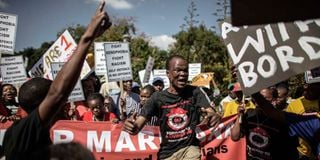
Thousands march against the recent wave of xenophobic attacks in South Africa through the streets of Johannesburg on April 23, 2015, as demonstrators sang songs denouncing xenophobia and carried banners that read "We are all Africans".
Overall, politics, policies and perceptions have limited the number of immigrants and shaped who they are likely to be.
Results from the national census of 2022 showed that the Southern African Development Community (SADC ) region is the dominant source for international migrants into South Africa, contributing 83.7 per cent of the total immigrant population.
In a shift of historical trends, immigrants from the United Kingdom and Europe have decreased from 22.3 per cent, in 2001, to just 4.9 percent in 2022.
According to independent organisation Migration Data Portal, an estimated 2.9 million migrants resided in South Africa in mid-2020, the country being Africa’s most industrialised economy and a particularly attractive destination for Africans in search of education and better opportunities.
Temporary immigrants
There are also several million Africans, not only from the SADC but from as far afield as Somalia, Rwanda, the DRC and Algeria, who entered South Africa ‘informally’ and are technically undocumented foreigners who could, at any time, be deported if caught by authorities.
It is widely held at street level that foreigners have been “stealing South Africans’ jobs”, which is counter-pointed by the fact that many of the foreigners operate only temporarily in the country, especially those from neighbouring states like Zimbabwe and Lesotho. They frequently come and go across borders as mini-importers of various goods to their homelands.
This cross-border trade is all informal and very hard to quantify reliably but is a mainstay of the national income for at least Zimbabwe, Lesotho and Eswatini whose nationals make up the majority undocumented cross-border migrants. They are estimated at between 3.5 and five million at any one time.
Solving the migration problem has been especially difficult for the ANC, which owes a debt to numerous African states where liberation movement fighters were housed and supported in their struggle to end race-based apartheid rule.
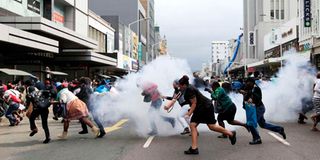
People take cover from a stun grenade and tear gas after a skirmish between locals and foreign nationals as thousands of people take part in the "peace march" against xenophobia in Durban, South Africa, on April 16, 2015.
Equally, the radical Economic Freedom Fighters (EFF) under Julius Malema have found themselves contradicting their own position, being that all Africans are, or ought to be, considered as one ‘extended family’ and should be able to come to South Africa freely.
But some EFF supporters are not at all happy with that element of the party’s agenda due the perception that ‘foreigners take local jobs’, and the party chiefs themselves have been involved in high-profile efforts to evict ‘non-documented foreigners’ from popular venues for selling sidewalk goods in places like the Mall of Africa in Johannesburg.
The DA wants open immigration to anyone with key skills, something the ANC has gradually and unwillingly been forced to agree to, especially as the Eskom outages have escalated in recent times.
Bouts of xenophobia
It is not clear what exactly is the position of the ‘party of Jacob Zuma’, uMkhonto we Sizwe (MK), on the thorny immigration issue, beyond a broad pan-Africanist approach.
On current trends, MK is likely to draw the fourth – perhaps even third – most votes in national elections scheduled for May 29.
But the party is still new, having been formed only last December, and is so focused on the personality of former president Zuma, that it has not yet formed a leadership structure, has no discernible policy platform beyond ousting the ANC from power, and has therefore not yet taken a clear stance on the immigration question.
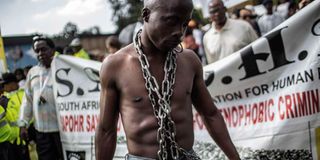
An anti-xenophobia activist stands chained in front of a banner, as thousands of people get ready to march against the recent wave of xenophobic attacks in South Africa through the streets of Johannesburg CBD on April 23, 2015. A fresh round of attacks has been reported in Limpopo Province.
But the effectively open border with Zimbabwe, and the special status bestowed on Zimbabweans who can obtain visas on arrival at border points – though many do not bother and cross the border illegally – has been recognised as a problem for the country, with a crackdown on illegal crossings intensifying recently.
Repeat bouts of deadly xenophobia have also helped drive the ANC into the undesired position, from its perspective, of having to close the county’s borders to most economic migrants and those fleeing disorder and chaos in their African homelands.
While most South African insist they are not xenophobes, it remains so that the ANC’s apparent willingness to let anyone from Africa into the country, along with only patchy efforts to repatriate the undocumented, have helped drive the ANC’s unpopularity among a population suffering under world-beating unemployment.




